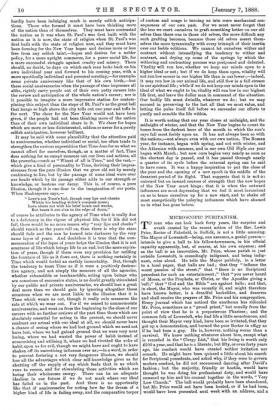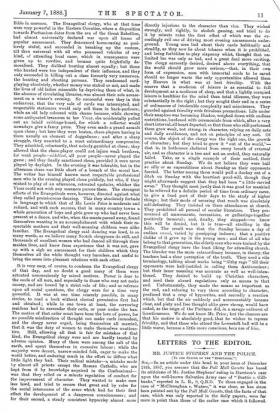MICROSCOPIC PURITANISM.
TO men who can look back forty years, the surprise and wrath created by the recent action of the Rev. Lewis
Price, Rector of Pakefield, in Suffolk, is not a little amusing. The Mayor of Lowestoft—being, one assumes, a genial person— intends to give a ball to his fellow-townsmen, in his official capacity apparently, but, of course, at his own expense ; and as the ball is an innovation, Mr. Price, whose parish is just outside Lowestoft, is exceedingly indignant, and being indig- nant, cries aloud. He tells the Mayor publicly, in a letter to a local paper, that balls are bad ; that they "inflame the worst passion of the street ;" that " there is no Scriptural precedent for such an entertainment ;" that "you never heard of Moses, or the Prophets, or Christ, or the Apostles giving a ball ;" that " God and the Bible" are against balls ; and that, in short, the Mayor, who was recently ill, and might therefore have known better, is a dreadful backslider, and deserves and shall receive the prayers of Mr. Price and his congregation. Every journal which has noticed the anathema has ridiculed Mr. Price, sometimes as a "proud priest," but usually from the point of view that he is a preposterous Pharisee ; and the common folk of Lowestoft, who find life a little monotonous, and thought their Mayor very kind, have been so irritated, that they got up a demonstration, and burned the poor Rector in effigy as if he had been a guy. He is, however, nothing worse than a survival. We know nothing whatever about him, except what is recorded in the "Clergy List," that his living is worth only 2200 a year, and that he is a literate; but fifty, or even forty years ago, his conduct would have created neither irritation nor remark. lie might have been quizzed a little about his search for Scriptural precedents, and asked why, if they were to govern modern conduct, he did not recommend dancing after David's fashion ; but the majority, friendly or hostile, would have thought he was doing his professional duty, and would have summed up him and his counsel together in the words, "Very Low Church." The ball would probably have been abandoned, but Mr. Price would not have been hooted, or if he had been, would have been presented next week with an address, and a
Bible in morocco. The Evangelical clergy, who at that time were very powerful in the Eastern Counties, where a disposition towards Puritanism dates from the era of the Great Rebellion, had almost universally declared war upon all forms of popular amusement. They denounced horse-racing as posi- tively sinful, and succeeded in breaking up the custom, till then universal with all who possessed vehicles of any kind, of attending local races, which in consequence were given up to rowdies, and became quite frightfully de- moralised. They disliked hunting almost equally ; but those who hunted were too independent of their influence, and they only succeeded in killing out a class formerly very numerous, the hunting and shooting parsons. They condemned card- playing absolutely, whether money was staked or not, and made the lives of old ladies miserable by depriving them of what, in the absence of circulating libraries, was almost their sole amuse- ment on a winter's evening. So successful were they in this endeavour, that the very sale of cards was interrupted, and respectable stationers would only sell them in back-parlours; while an old lady coloured with shame because, while showing some antiquated treasures to her Vicar, she accidentally pulled out an inlaid cribbage-board, for which a collector would nowadays give a fancy price. They even made a grand assault upon chess ; but here they were beaten, chess-players having in them usually an element of doggedness ; and after a sharp struggle, they assented to a most extraordinary compromise. They admitted, reluctantly, that nobody gambled at chess ; they allowed that the chess-player could not injure weak brethren, for weak people—videlicet, all poor people—never played the game ; and they finally sanctioned chess, provided it were never played by daylight. In the evening it was tolerable, but in the afternoon chess was little short of a breach of the moral law. The writer has himself known most respectable professional men who in the evening played chess publicly, but who, if they wished to play of an afternoon, retreated upstairs, whither the Vicar could not with any manners pursue them. The strongest efforts of the Evangelicals were, however, directed against what they called promiscuous dancing. This they absolutely forbade in language to which that of Mr. Lewis Price is moderate and refined, and with such success, that in many country towns a whole generation of boys and girls grew up who had never been present at a dance, and who, when the mania passed away, found themselves wanting in an accomplishment with which their re- spectable mothers and their well-meaning children were alike familiar. The Evangelical clergy said dancing was lewd, in so many words, as we believe many Scotch clergymen do still, and thousands of excellent women who had danced all through their maiden lives, and knew from experience that it was not, gave up with a sigh an amusement for their children which they themselves all the while thought very harmless, and useful to bring the sexes into pleasant relations with each other.
It is very easy, of course, to condemn the Evangelical clergy of that day, and no doubt a good many of them were actuated unconsciously by mixed motives. Power is dear to the souls of all men, and especially to those who may not make money, and are bound by a strict rule of life ; and as referees upon all social questions, the clergy were for a time very powerful. It was at one time scarcely possible, in many circles, to read a book without clerical permission first had and obtained ; while in one town at least, the sorrowing maidens had to surrender their curls, or pass under the ban. The motive of that order must have been the love of power, for no possible misdirection of thought can make curls immodest, and the clergy never urged, being themselves all married, that it was the duty of women to make themselves unattrac- tive. Still, allowing all that is fair for mistakes of that kind, the Evangelical clergy were and are hardly treated by adverse opinion. Many of them were among the salt of the earth, and spent themselves in excessive labour; while the majority were decent, narrow-minded folk, eager to make the world better, and enduring much in the effort to diffuse what little light they had. Their radical mistake—a mistake made by almost all priests except the Roman Catholic, who are kept from it by knowledge acquired in the Confessional— was that they relied on a minute regulation of conduct for the improvement of character. They wanted to make men less lewd, and tried to secure that great end by rules for the social intercourse of the sexes which had for their first effect the development of a dangerous consciousness ; and for their second, a steady consistent hypocrisy almost more directly injurious to the character than vice. They wished strongly, and rightly, to abolish gaming, and tried to do it by minute rules the first effect of which was the ex- ceedingly evil one of driving most evening amusements under- ground. Young men lied about their cards habitually and steadily, as they now lie about tobacco when it is prohibited, and being forbidden to play sixpenny whist, thought that un- limited loo was only as bad, and a great deal more exciting. The clergy earnestly desired, desired above everything, that the world should grow more serious,—that, in their own form of expression, men with immortal souls to be saved should no longer waste the only opportunities allowed them by Heaven in what was at best frivolity. With the reserve that a modicum of leisure is as essential to full development as a modicum of sleep, and that a lightly occupied leisure is healthier for the mind than total idleness, they were substantially in the right ; but they sought their end in a series of ordinances of intolerable complexity and minuteness. They guarded against frivolity with frivolous precautions. Life under their auspices was becoming Hindoo, weighed down with endless restrictions, burdened with ceremonials from which, after a very short interval, all heart departed, so that those who still performed them grew weak, not strong, in character, relying on daily acts and daily avoidances, and not on principles of any sort. Of course, the object of the clergy was the right one, the growth of character; but they tried to grow it "out of the world,"— that is, in hothouses sheltered from every breath of external air, and as character is a tree and not an orchid, they naturally failed. Take, as a single example of their method, their practice about Sunday. We do not believe they were half so silly or so superstitious about Sunday as their opponents fancied. The better among them would pull a donkey out of a ditch on Sunday with the heartiest good-will, though they might afterwards suggest that they had been "a little carried away." They thought most justly that it was good for mankind to be relieved for a definite period of time from ordinary cares, to give a fixed part of their days to the study of higher things ; but their mode of securing that result was absolutely self-defeating. They insisted on three attendances at church. They prohibited all perusal of secular literature. They pro- nounced all amusements, recreations, or gatherings-together positively immoral ; and, finally, they stopped—we know this will be denied, but it is true—all strolling in the fields. The result was that the Sunday became a day of endless ennui, varied by gossipping indoors ; that a positive dislike of it grew up in the young men ; and that of all who belong to that generation, the elderly men who were trained by the Evangelical clergy have the least liking for attending church. The blunder was the more extraordinary because, in theory, the teachers had a clear perception of the truth. They used a vile terminology, talking about works being "filthy rags" till their opponents were half-justified in calling them Antinomians ; but their inner meaning was accurate as well as well-inten- tioned. They desired to build up Christian characters, and used their absurd regulations only as means to that end. Unfortunately, they made the means as important as the end, and refusing to vary them according to character, produced first a crop of hypocrites, and secondly a reaction which, but that the air suddenly and unccconntably became clear, and piety and free thought alike grew strong, would have ended, as the reign of the Puritans did, in a savage outburst of licentiousness. We do not know Mr. Price ; but the chances are that his motive is absolutely good, that he wishes to repress frivolity, and that those who attend the Lowestoft ball will be a little worse, because a little more conscious, beca use of him.























































 Previous page
Previous page